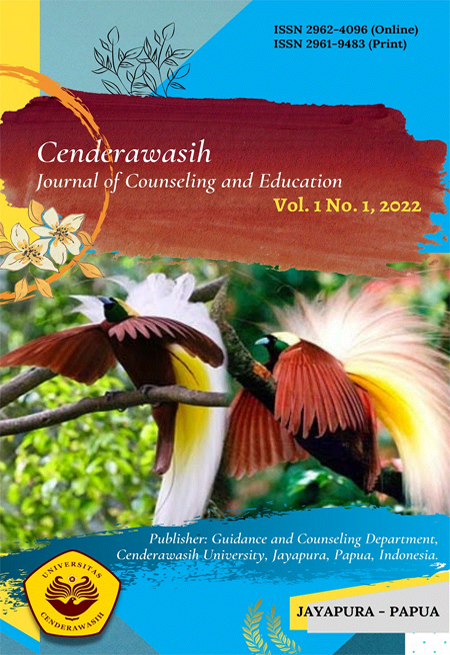Collaboration of Vocational Training Institutions to Improve Vocational Students' Career Development Planning
DOI:
https://doi.org/10.31957/cjce.v2i2.3675Keywords:
Collaboration , Plan Career , Development PotencyAbstract
Facing the demand for a workforce that is trained and ready to work is a tough challenge for education in Indonesia. Vocational schools are needed that can be used as examples so that the education system that has been built currently can play its maximum role power expert professional to create school graduates who have career maturity. The aim is to motivate graduates so that they are confident in their abilities and ready to have a career in the world of work armed with the skills they acquired during their vocational education. Methodology study This with approach descriptive qualitative, pheno menological design or symptoms in detail as well as a response to the research subject. Technique Data collection includes observation , interview , documentation . The results of this research explain that career development stages are a way to position where individuals are in professional life . Career development stages are important for individuals to find the purpose of their life in the future. The stages of career development are as follows: First, initial career, the first stage where an individual enters an institution. The individual tries to get an idea of the skills and interests he has. Second, mid-career, the stage where individuals will experience a transition of change in their career, due to the acquisition of information and career guidance training that has been obtained. The third final career, the stage at which an individual can be productive with a career commitment that has become his goal, also has long-term planning. Then there are two strategies for implementing career development programs for students, namely a comprehensive strategy and an approach strategy for students.
Keywords : Collaboration , Plan Career , Development Potency
Downloads
References
Ainiyah, N. (2013). Character Formation Through Islamic Religious Education. Al-Ulum Journal, 13(1), 30. https://doi.org/10.34005/tahdzib.v2i2.511
Darmadi, H. (2013). Dimensions of Educational and Social Research Methods. Bandung: Alphabeta.
Fathul Amin. (2019). Character Formation Through Islamic Religious Education. Tadris: Journal of Islamic Educational Research and Thought, 12(2), 3. https://doi.org/10.51675/jt.v12i2.22
Haudi. (2020). Basics of Education. Solok: Independent Intellectual Person.
Inkiriwang, R.R., Singal, R., & Roeroe, J.V. (2020). State Obligations In Providing Educational Facilities to The Community According to Law Number 20 of 2003 Concerning The National Education System. Lex Privatum, 8(2), 144. http://hpj.journals.pnu.ac.ir/article_6498.html
Lalo, K. (2018). Creating a Millennial Generation with Character with Character Education to Welcome the Era of Globalization. Police Science, 12(2), 69.
Lubaba, MN, & Alfiansyah, I. (2022). Analysis of the Application of the Pancasila Student Profile in Forming Student Character in Elementary Schools. Edusaintek, 9(3), 694.
Mahmudin, AS (2021). Development of Teaching Materials for Islamic Religious Education Subjects by Elementary School Teachers. SITTAH: Journal of Primary Education, 2(2), 100. https://doi.org/10.30762/sittah.v2i2.3396
Martono, N. (2016). Social Research Methods. Jakarta: Rajawali Press.
Matlani, & Khunaifi, AY (2019). Critical Analysis of the National Education System Law Number 20 of 2003. 13(2), 84.
Nur, K. (2014). Islamic Education Paradigm In The 2003 National Education System Law. Journal of Education, 2(1), 73. https://eje.bioscientifica.com/view/journals/eje/171/6/727.xml
Prihatmojo, A., & Badawi. (2020). Character Education in Elementary Schools Prevents Moral Degradation in Era 4.0. DWIJA CENDEKIA: Pedagogical Research Journal, 4(1), 144. https://doi.org/10.20961/jdc.v4i1.41129
Solehat, TL, & Ramadan, ZH (2021). Analysis of the Character Education Strengthening Program in Islamic Religious Education (PAI) Subjects in Elementary Schools. Basicedu Journal, 5(4), 2273. https://jbasic.org/index.php/basicedu/article/view/1202
Utami, RD (2016). Building the Character of Muhammadiyah Basic Education Students Through Identifying the Implementation of Character Education in Schools. Elementary Education Professions, 2(1), 32–40. https://doi.org/10.23917/ppd.v2i1.1542
Zuriah, N. (2009). Social and Educational Research MethodologySocial and Educational Research Methodology. Jakarta: Bumi Literacy.
Downloads
Published
Versions
- 2024-05-21 (3)
- 2024-05-21 (2)
- 2024-05-18 (1)
Issue
Section
License
Copyright (c) 2024 Nakhma'ussolikhah, Meliyana, Hidayati, Mohammad Arief Budiman

This work is licensed under a Creative Commons Attribution-NonCommercial 4.0 International License.
Authors full retain the copyright and publishing rights without restrictions of their published works on Cenderawasih Journal of Counseling and Education under a Creative Commons Attribution-NonCommercial 4.0 International License.
In case, the article was jointly prepared by more than single author, any authors submitting the manuscript warrants that he/she has been authorized by all co-authors to be agreed on this copyright and license notice (agreement) on their behalf, and agrees to inform his/her co-authors of the terms of this policy.
The author(s) whose names are listed in their manuscript also declared that they have no conflict of interest and indicate agreement that the all information in their article is true and correct.





